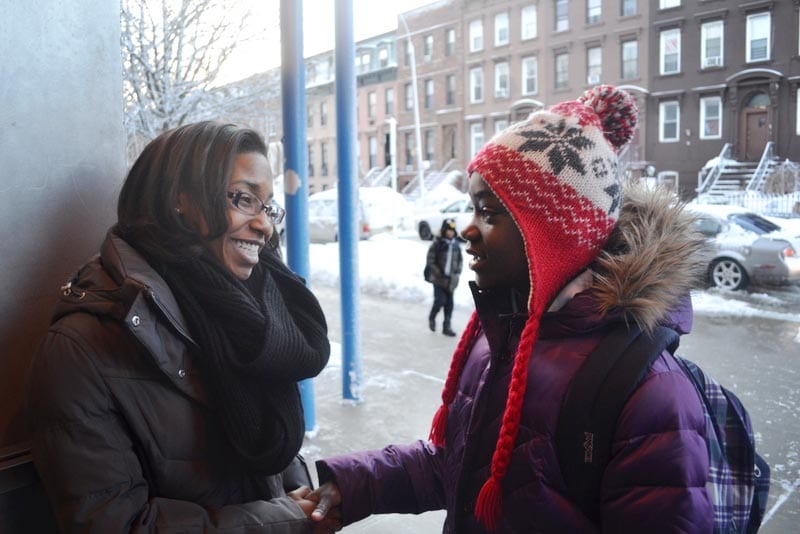This post is an excerpt from Making a Difference in Education, a story featured in the Fall 2014 issue of Among Friends magazine.
[wc_divider style=”dashed” line=”single” margin_top=”” margin_bottom=””]
Kennette Banks ’02
- B.A. Swarthmore College
- M.Ed. University of Pennsylvania
- Director of Operations, Uncommon Schools, New York, NY
[wc_divider style=”dashed” line=”single” margin_top=”” margin_bottom=””]
Who inspired you to become an educator?
My mother had a lot to do with my involvement in education. Growing up, she pushed me to work hard and not take anything for granted. The other piece that helped solidify my interest was my mother’s own experience desegregating schools after Brown vs. Board of Education. As one of the first African Americans to attend an all-girls school in Baltimore, my mother had to fight for her education. I see my work now as an extension of that: I am continuing her fight for equal access.
What other factors influenced you in your journey?
I first became involved in education academically at Swarthmore, when I took an Introduction to Education course. It was known as “the class you had to take” and the one that would contextualize your educational experience. After taking the course, I gained a better understanding of the ways in which privilege and education are connected in our country: not everyone has the same educational opportunities or access. There are discrepancies in our educational system, and I saw more clearly how these discrepancies often fell along the lines of race and class.
My first job after college was working in admissions at Swarthmore. I wanted to provide access to higher education to students who were smart and deserving, but who may have not had the privilege of strong preparation. This was relatively naive of me, as I soon learned that the admissions process (especially at elite colleges and universities) kept more people out than it let in — I realized that it was already too late for many of the applicants. Without adequate college preparation, students’ chances of getting into a strong four- year university were severely limited. This experience prompted me to work with younger students in a more direct way.
What do you value most about your work with students?
I am most passionate about creating opportunities, both educational and otherwise, for students of color and low-income students for whom various opportunities might not be readily available.
How would you describe your organization?
My school, Leadership Prep Bedford Stuyvesant, is part of a network of high performing charter schools — across Brooklyn, Newark, Rochester, Troy, Boston, and now Camden — called Uncommon Schools. Leadership Prep is located in the Bedford-Stuyvesant neighborhood of Brooklyn and has approximately 440 scholars from kindergarten through fourth grade, with about 47 staff members and teachers. Our mission is to prepare all of our scholars to attend and succeed in a four-year college.
What is your current title, and what do you do on a daily basis?
My current title is Director of Operations. Leadership Prep operates on a co-leader model, where the Principal is the Instructional Leader of the school. She observes classroom teaching, gives feedback, reviews curriculum, and identifies the highest-leverage factors for teachers to address in order to improve student achievement.
So that her focus can remain on instruction, I manage the day-to-day operations of the school: everything from managing our budget, to making sure we are in compliance with the state, to overseeing our facility and building the school schedule. I support teachers to make sure they can do their jobs effectively, I make sure that our buses drop off our scholars on time, and I make sure that each student receives a hot lunch — all of the logistics that help our school succeed.
How would you say your experience at MFS influenced your professional life and interests?
I think that my lifelong Quaker education at Haddonfield Friends, Moorestown Friends, and Swarthmore instilled in me a strong sense of justice and equality. If I saw something that I thought was unjust, I believed I should do something to fix it. I couldn’t be a bystander to injustice.
Did any faculty or staff members have an impact on your career?
Brooke Smith, Karen Washington, and Tina Corsey are teachers who stand out to me now. They all pushed me to work hard and to never settle, but they also played a major role in supporting me as an individual. They helped me to understand my experience at MFS both as I was experiencing it and after graduating.
If you could share one insight about your educational philosophy with others, what would it be?
I think that we often focus on the students themselves and their need to achieve (which places both the blame and responsibility to fix it on them). In the majority of situations, however, the achievement gap exists and persists because of disparities in opportunities. We need to focus on erasing the opportunity gap as a means to addressing the achievement gap.
[wc_button type=”primary” url=”https://www.mfriends.org/news/among-friends-magazine/making-a-difference-in-education” title=”Making a Difference in Education” target=”self” position=”float”]Read More Interviews: Alumni in Education[/wc_button]

